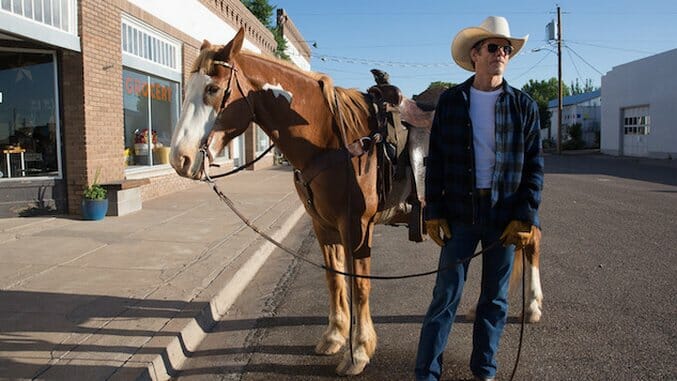I Love I Love Dick Because I Love Dicks
Patrick Wymore/Amazon Prime Video
Dear Dick,
I have known you a long time—longer than I care to admit. Not you, exactly: not the frustrated artist (Kevin Bacon) of concrete monoliths in the desert; not the taciturn figure that director and I Love Dick co-creator Jill Soloway films with such indecent abandon that rolling a cigarette seems a come on, rejection a seduction, humiliation a form of foreplay. No, I mean the Dicks of my own experience, reflected and refracted by Soloway and Sarah Gubbins through the perfect sensitivities of Kathryn Hahn: the actor, the activist, the poet (twice), and finally the latest Dick, of more recent vintage, his pepper beard now flecked with salt. Lately, I’ve found myself wondering why I am so consumed by you, or these versions of you, and in their bracing, frank portrait of infatuation, Soloway, Gubbins and Hahn offer an answer.
This isn’t about you at all.
“Desire isn’t lack,” writes Hahn’s Chris Krauss, the real-life writer and filmmaker whose 1997 novel, I Love Dick, is the series’ source material. “It’s excess energy. A claustrophobia inside your skin.” Dick, you’ve surely seen the awful fumblings of unrequited desire in my own dealings with you—the halting attempts to explain my emotions; the pass I made that you welcomed, and the later one you rebuffed—but I had not seen them myself until I saw Hahn, that master of the unfinished sentence, that artist of confused disbelief. As Chris, she moves along in a languid saunter, almost a slouch; when her cell phone rings at an inopportune moment, or when she tries to screen her mournful short, she actualizes fluster so convincingly I can’t help but wince. Hahn’s performance is so perceptively physical—contorting her face in orgasm, recoiling from touch, tapping and pacing and fretting and squatting—that the series often depicts her in triptychs of still images, as if desperate to slow her down. Dick, if you only knew: My thoughts about you race so fast that my fluster isn’t the half of it.
What Chris comes to realize, though, while waylaid in Marfa, Texas with you and her husband, Sylvere (Griffin Dunne), is that the agitation, the obsession, is the symptom, not the cause. Those lascivious montages of your arms, your crotch, your imagined caress suggest the sort of longing that runs much deeper than lust, and from that first meal together she knows, instinctively, that her shiver of desire is linked to the claustrophobia inside her skin: “I’ve never had someone shatter in one glance the persona that I’ve spent decades constructing,” she writes, and this is your foremost power, Dick—to slip into the cracks in her façade, and mine, and then set off our implosions.
I wanted you. I still want you, if I’m being honest. But I’m no longer sure that this means what I thought it did, that it’s as simple as that night in my room or that ride home in the cab—even though, as with Chris and Sylvere, the “game” of it was so pleasurable my heart thumps at the memory. When we kissed, stripped, fucked, what I wanted, underneath the frisson of flirtation, was what the female protagonist of Chris’ short wants: “I feel like you don’t see me,” she says nakedly, so vulnerable, so direct, that I had to turn away. Dick, I want you—Chris wants you—because we’re scared that we might be invisible, and our culture is one in which being desired, being desirable, is the easiest way to be seen.